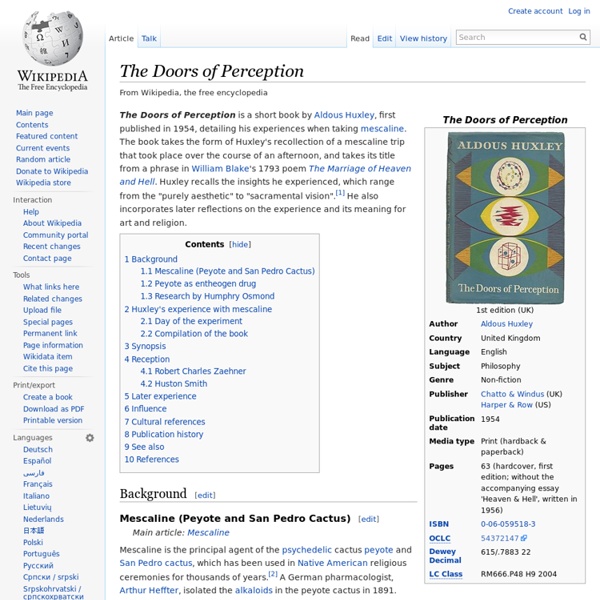Potopia
Could Shutdown Haunt Burwell? by Ben Jacobs Larry Downing/Reuters Obama’s nominee to succeed Kathleen Sebelius played a key role in closing Washington’s monuments—a...
Heaven and Hell (essay)
Heaven and Hell is a philosophical essay by Aldous Huxley published in 1956. Huxley derived the title from William Blake's book The Marriage of Heaven and Hell. The essay discusses the relationship between bright, colorful objects, geometric designs, psychoactives, art, and profound experience. Heaven and Hell metaphorically refer to what Huxley conceives to be two contrary mystical experiences that potentially await when one opens the "doors of perception"—not only in a mystical experience, but in prosaic life. In his earlier narrative The Doors of Perception (1954), Huxley recounted in detail his first experience of mescaline. The Doors of Perception and Heaven and Hell, 1954, 1956, Harper & Brothers 1977 Harpercollins (UK), mass market paperback: ISBN 0-586-04437-X1990 Harper Perennial edition: ISBN 0-06-090007-52004 Harper Modern Classics edition: ISBN 0-06-059518-32004 Sagebrush library binding: ISBN 1-4176-2859-6
Carlos Castaneda
Carlos Castañeda cuyo nombre original es Carlos César Salvador Arana Castañeda (Cajamarca, Perú, 25 de diciembre de 1925 — Los Ángeles, 27 de abril de 1998) fue un antropólogo y escritor peruano naturalizado estadounidense, autor de una serie de libros que describirían su entrenamiento en un tipo particular de nahualismo tradicional mesoamericano, al cual él se refería como una forma muy antigua y olvidada. Dichos libros y el propio Castañeda, quien en escasas ocasiones hablaba en público acerca de su obra o de si mismo, son objeto de mucha controversia. Sus partidarios afirman que sus libros son veraces en su contenido, o que al menos constituyen obras de valor literario y antropológico. Sus críticos señalan por el contrario que sus libros son una farsa, trabajos de ficción, y que no son verificables como obras de antropología, al contrario de lo que el autor afirmaba. Sus primeros libros están ligados a la psicodelia y la contracultura de fines de los años 60 y 70. Biografía[editar]
The Internet map
Should the U.S. legalize hard drugs?
Consider current policy concerning the only addictive intoxicant currently available as a consumer good — alcohol. America’s alcohol industry, which is as dependent on the 20 percent of heavy drinkers as they are on alcohol, markets its products aggressively and effectively. Because marketing can drive consumption, America’s distillers, brewers and vintners spend $6 billion on advertising and promoting their products. Americans’ experience with marketing’s power inclines them to favor prohibition and enforcement over legalization and marketing of drugs. But this choice has consequences: More Americans are imprisoned for drug offenses or drug-related probation and parole violations than for property crimes. And although America spends five times more jailing drug dealers than it did 30 years ago, the prices of cocaine and heroin are 80 to 90 percent lower than 30 years ago. Dealers, a.k.a. Marijuana probably provides less than 25 percent of the cartels’ revenue. georgewill@washpost.com
Player Piano
Player Piano, author Kurt Vonnegut's first novel, was published in 1952. It is a dystopia of automation,[1] describing the dereliction it causes in the quality of life.[1] The story takes place in a near-future society that is almost totally mechanized, eliminating the need for human laborers. This widespread mechanization creates conflict between the wealthy upper class—the engineers and managers who keep society running—and the lower class, whose skills and purpose in society have been replaced by machines. The book uses irony and sentimentality, which were to become a hallmark developed further in Vonnegut's later works.[1] In a 1973 interview Vonnegut discussed his inspiration to write the book:[2] I was working for General Electric at the time, right after World War II , and I saw a milling machine for cutting the rotors on jet engines, gas turbines. A player piano is a modified piano that "plays itself". Player Piano is set in the future after a fictional third world war. Anita Dr.
Las Puertas de la Percepcción
The Narco State - By Charles Kenny
America's longest running war -- the one against drugs -- came in for abuse this weekend at the Summit of the Americas. The abuse is deserved. Forty years of increasingly violent efforts to stamp out the drug trade haven't worked. And the blood and treasure lost is on a scale with America's more conventional wars. On the upside, we know that an approach based around treating drugs as a public health issue reaps benefits to both users and the rest of us. President Otto Perez Molina of Guatemala opened the rhetorical offensive against the drug war last week when he wrote that "decades of big arrests and the seizure of tons of drugs" have not stopped "booming" production and consumption. But it isn't just in Latin America that the winds of change are blowing when it comes to drugs policy. As a domestic policy, a harsh enforcement approach has done little to control drug use, but has done a lot to lock up a growing portion of the U.S. population.



